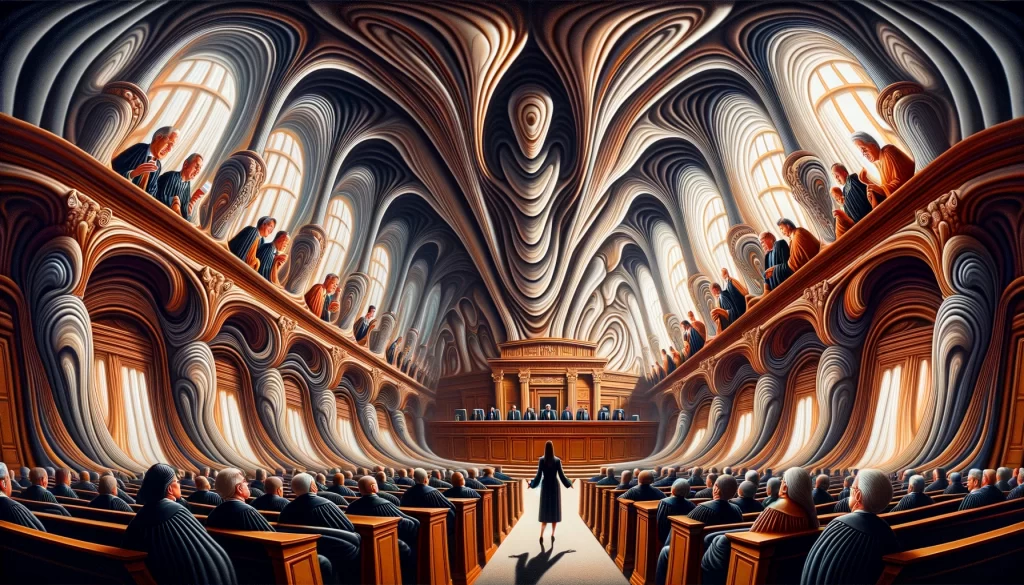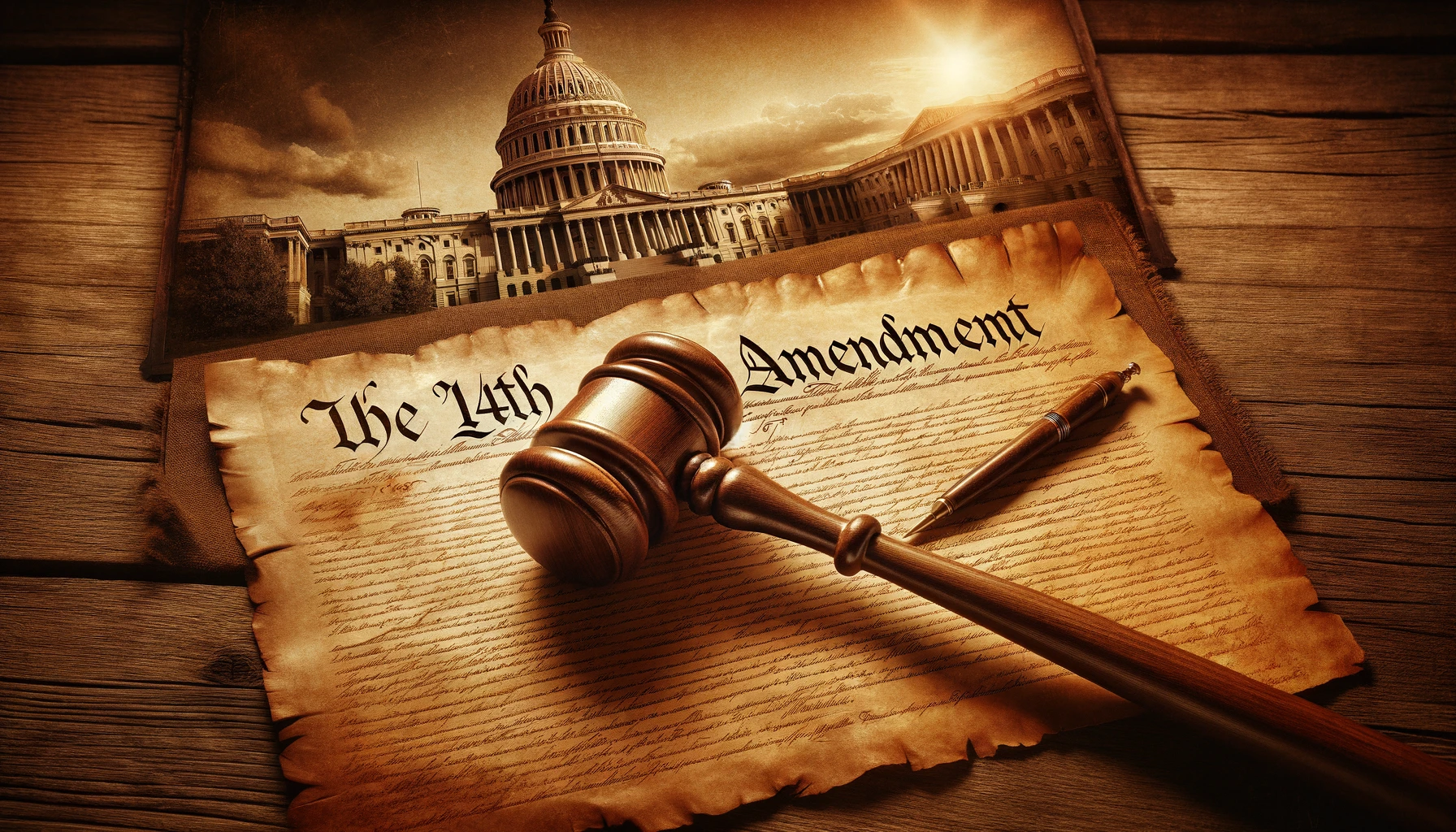The Supreme Court made a big decision that affects the whole country and its future presidential elections. They decided that former President Donald J. Trump can run for president again, even though there was a challenge that said he shouldn’t be allowed to because of his actions related to the Capitol attack on January 6, 2021. This was a big deal because it could have changed who you see on the ballot when it’s time to vote for the next president.
Here’s the scoop: The Constitution has a part called Section 3 of the 14th Amendment. It says that if someone participates in an insurrection (a violent uprising against an authority or government), he/she can’t hold a big job in the government. Some people thought this meant Mr. Trump couldn’t run for president again. But the Supreme Court said that it’s up to Congress, not individual states, to decide if this rule applies to presidential candidates. This means that unless Congress passes a specific law about it, states can’t just decide on their own to keep someone off the ballot for president.
The justices, who are the top judges in the country, all agreed on this point. But they had different reasons for their decisions. Some thought the decision should be simple – just about whether states can block a candidate like this. Others went further, saying Congress needs to make clear rules about when this part of the Constitution can be used to stop someone from running for office.

Three of the justices, who are often seen as more liberal, didn’t like that the Court went beyond the basic question. They thought the Court was making new rules that weren’t needed for this case. They said this could stop future efforts to question if someone is qualified under this rule. Basically, they thought the Court should have just answered the simple question and not gotten into making new guidelines.
Justice Amy Coney Barrett, another judge, also thought the Court went too far. But she pointed out that all nine justices agreed on the main point, which was rare and important, especially during a tense political time. She thought this agreement was something Americans should focus on, showing that even in disagreements, there can be unity.
The decision was a big one, kind of like another case you might have heard of, Bush v. Gore, which decided a presidential election back in 2000. Mr. Trump was happy with the decision, saying it was good for future presidents.
This all started with a challenge from voters in Colorado who didn’t want Mr. Trump on the ballot because of his actions related to the 2020 election and the Capitol attack. The Colorado courts had some back-and-forth on this, but in the end, it went to the Supreme Court to decide.
The Supreme Court’s decision means Mr. Trump can be on the ballot, and it also sets the stage for how similar situations might be handled in the future. It says that if we’re going to use this part of the Constitution to decide who can run for president, then Congress needs to make the rules clear.
And there’s more to come. The Supreme Court is also looking at other cases related to Mr. Trump and his actions, so we’ll be hearing more about this in the future.
This article is based on the following article:
https://www.nytimes.com/live/2024/03/04/us/trump-supreme-court-colorado-ballot

Background Information
Understanding these concepts and the historical context provides a solid foundation for grasping the significance of the Supreme Court’s ruling and its implications for American democracy, particularly regarding who is eligible to run for and hold public office.
1. The U.S. Supreme Court
– What It Is: The Supreme Court of the United States (SCOTUS) is the highest court in the federal judiciary of the United States. It has the ultimate authority in interpreting the U.S. Constitution and federal laws. Its decisions set precedents that all other courts follow.
– Justices: The Court consists of nine Justices, including one Chief Justice and eight Associate Justices, appointed by the President and confirmed by the Senate. These justices serve for life, unless they resign, retire, or are removed after impeachment.
– Role in Elections: While the Supreme Court does not directly involve itself in electoral processes, it can rule on legal disputes that affect elections and, by extension, the democratic process.
2. The 14th Amendment, Section 3
– Historical Context: Adopted in 1868, the 14th Amendment addresses citizenship rights and equal protection under the law in the aftermath of the Civil War. Section 3 of this amendment was specifically designed to prevent individuals who engaged in insurrection or rebellion against the United States from holding public office.
– Text and Interpretation: Section 3 has rarely been invoked since the Civil War era. Its interpretation, especially regarding what constitutes “engagement in insurrection or rebellion,” can be complex and has become more relevant in light of recent events.
3. Insurrection
– Definition: An insurrection is a violent uprising against government authority or structure. It’s not merely a protest but an attempt to take or disrupt government power through unlawful means.
– Relevance to Donald J. Trump: The challenge to Trump’s eligibility to run for office again was based on allegations related to his actions surrounding the January 6, 2021, attack on the U.S. Capitol. Critics argued that his conduct amounted to insurrection, as defined by Section 3 of the 14th Amendment.
4. Presidential Eligibility
– Constitutional Requirements: To be President of the United States, a person must be a natural-born citizen, at least 35 years old, and a resident within the United States for 14 years. The Constitution does not explicitly mention disqualifications based on behavior like insurrection.
– Impact of SCOTUS Decision: The Supreme Court’s ruling emphasizes that individual states cannot unilaterally decide to bar a candidate from running for federal office based on allegations of insurrection, highlighting the role of Congress in enforcing Section 3 of the 14th Amendment.
5. Congress’s Role
– Legislation and Enforcement: According to the Supreme Court’s decision, it’s up to Congress to enact legislation to enforce Section 3 of the 14th Amendment. This means that without specific laws, states do not have the authority to disqualify candidates from federal office based on accusations of insurrection.
6. Importance of This Ruling
– Presidential Elections: This decision directly impacts who can run for President and underlines the balance of power between state and federal authorities in determining eligibility for office.– Future Implications: It sets a precedent for how similar cases might be handled and highlights the need for potential legislative action by Congress to clarify enforcement mechanisms for Section 3 of the 14th Amendment.
Please subscribe to Insight Fortnight, our biweekly newsletter!
